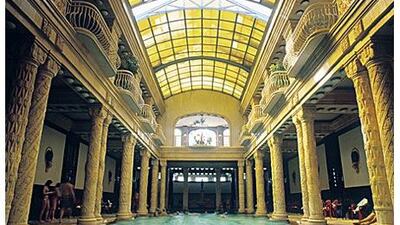With a rich past that includes histories of occupation, interaction or warfare with the Romans, Mongols, Ottomans, and communists, the city of Budapest boasts a wealth of interesting and varied architecture. It is a remarkably dynamic capital cut in two by the beautiful Danube, with a population as adapted to soaking in the hundreds of thermal baths as they are to partying all night long all across the city. An easy city to walk around, it also offers a clean, efficient metro and tram system to get you anywhere you want to go. Originally two cities, Buda and Pest, both with different characteristics, you can easily escape the hustle and bustle of Pest to the more sedate Buda, or the other way around. In short, a weekend in Budapest can be whatever you want it to be: crazy, fun and exhausting or relaxed, quaint and invigorating. Or, of course, you can work out a trip that is somewhere in between.
Chill out during the day by heading to one of Budapest's thermal baths, where you can dip into pools of warm, hot or extremely hot water, enjoy saunas, massages and generally be pampered. There are literally hundreds options to choose from, including the Szecheny (www.szechenyibath.com), which is probably the most famous one in town, and the Gellert (www.gellertbath.com), a slightly smaller, slicker operation. Both cost about US$15 (Dh55) for general admission; therapeutic treatments cost extra.
Take a free walking tour with an English-speaking guide to show you around town (www.freebudapesttours.eu), or go on your own on a walk along the Danube to see Buda Castle, a Unesco world heritage site. Take the funicular railway up to the Hungarian National Art Museum and gaze at the remarkable works of art and statues that Budapest has to offer, as well as a view from the hilltop over the whole city.
Saint Gellert had an unfortunate ending - pagans stuffed him in a barrel and rolled him down a hill into the Danube in the 9th century. Hardly compensation, the hill has been named in his honour and a climb up Gellert Hill will offer one of the best panoramic views of the city. You can also visit the 19th century Citadella on top. If you're bored of walking up hills, head to one of the numerous art galleries and museums, including the Hungarian National Gallery (www.mng.hu), Museum of Fine Arts (www.szepmuveszeti.hum), and the National Museum (www.hnm.hu).
For a different experience head to Budapest's secret nuclear bunker and hospital, the Cave Hospital in the Rock (www.sziklakorhaz.hu), where you get to experience what it was like during the closing days of Second World War. The House of Terror Museum (www.terrorhaza.hu) gives a chilling portrayal of life in Hungary, as it was the headquarters of the secret police of both the Nazi and communist regimes.
Budget Central Backpack King is a surprisingly clean and tidy hostel right in the centre of Budapest, within easy walking distance of the chain bridge over the Danube. It has free Wi-Fi internet, great common room facilities, and a staff happy to help with any questions about Budapest. Dorms cost from $22 (Dh80) per night, including taxes. Central Backpack King, Október 6. utca 15 (www.hostelworld.com/budapest; 0036 3 0200 7184).
Mid-range Danubius Hotel Gellért is attached to the famous Gellert Spa, a convenient choice if you want a weekend relaxing by the pool or regular massages after some time in the sauna. Double rooms cost from $207 (Dh761) per night, including taxes. Danubius Hotel Gellért, Szent Gellért tér 1 (www.danubiushotels.hu; 0036 1 889 5500). Luxury The Four Seasons Gresham Palace is one of the most modern and luxurious hotels in Budapest, with a great central location giving you access to all the city has to offer. Double rooms cost from $414 (Dh1,523) per night, including taxes. Four Seasons Gresham Palace, Roosevelt Tér 5-6 (www.fourseasons.com/budapest; 0036 1 268 6000).
Breakfast Sit surrounded by history at Cafe Gerbeaud (www.gerbeaud.hu) on Vosmarty Square, an eatery built at the height of the Austro-Hungarian empire and still going strong. A breakfast of sweet and salty rolls, condiments, cold meats and cheeses, coffee or tea costs from $12 (Dh44).
Lunch Head to the Aranyszarvas Restaurant just after the Erzsebet Bridge in Taban Park to gorge on wild boar, pheasant or venison dishes and satisfy your inner carnivore. Dishes cost from $15 (Dh55). Dinner Booking ahead is a good idea for a fine meal at Menza (www.menza.co.hu). With a wide range of fine Hungarian dishes on offer, such as a starter of goulash soup followed by fried bread stuffed with chicken breast. Main courses cost from $25 (Dh92).
Return flights from Dubai to Budapest on Smartwings (www.smartwings.com) cost from $762 (Dh2,800) including taxes.
Hungarian being one of the least comprehensible languages in Europe that English speakers are likely to encounter, I recommend a good, solid read of Colloquial Hungarian: The Complete Course for Beginners by Carol H. Rounds and Erika Solyom.

